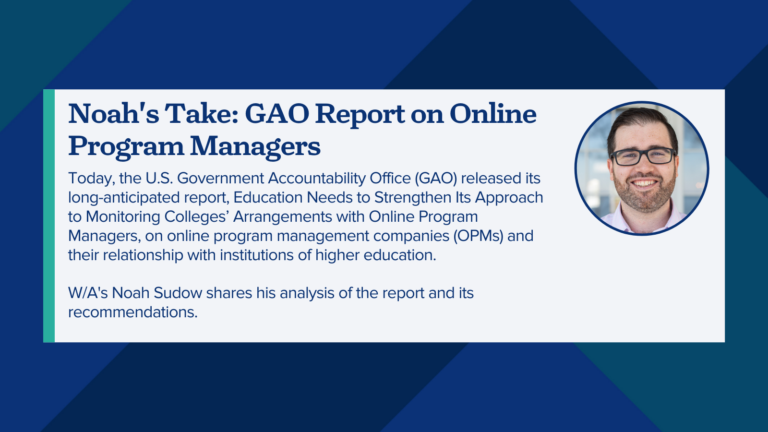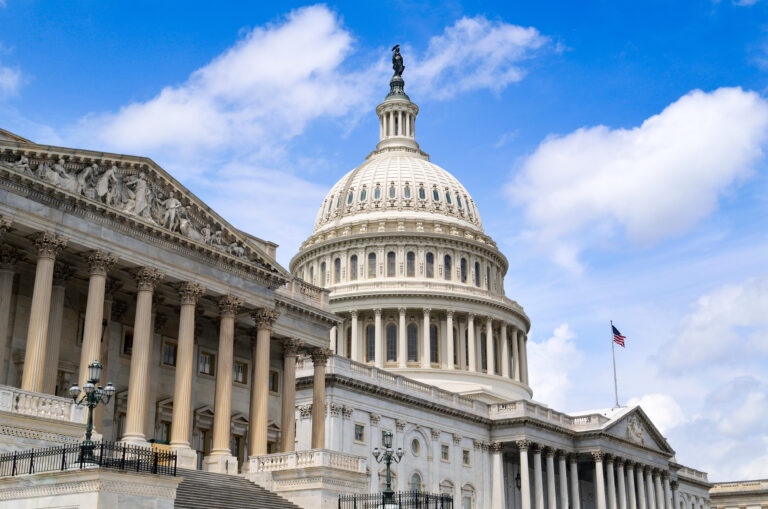Today, the U.S. Government Accountability Office (GAO) released its long-anticipated report, Education Needs to Strengthen Its Approach to Monitoring Colleges’ Arrangements with Online Program Managers, on online program management companies (OPMs) and their relationship with institutions of higher education. As background, the report was originally requested in early 2021 by Senators Elizabeth Warren (D-MA) and Patty Murray (D-WA). Murray also serves as chair of the U.S. Senate Committee on Health, Education, Labor and Pensions (HELP).
OPM partnerships with institutions of higher education have grown mightily in recent years. Many of these partnerships depend on revenue-sharing arrangements that operate under the safe harbor of the federal incentive compensation ban. This safe harbor was clarified in a 2011 Dear Colleague Letter (DCL) issued by the U.S. Department of Education (ED). The GAO report comes on the heels of increased attention from the U.S. Senate on the relationships between OPMs and higher education institutions, including two rounds of letters sent by Senators Warren and Sherrod Brown (D-OH) to the largest OPMs. The letters asked these companies for information about their contracts and tuition-sharing agreements with higher education institutions.
The GAO report’s findings focus on the lack of data currently available about OPMs and their arrangements with institutions as they relate to student recruitment.
GAO offers two specific recommendations for ED in the report. GAO advises ED to give clear instructions to institutions and their auditors about the type of information contained in OPM agreements that must be assessed during compliance reviews to identify incentive compensation violations. The recommendations are as follows:
- The Secretary of Education should provide additional instructions for inclusion in the Compliance Supplement to help auditors better identify and assess potential incentive compensation ban violations when a college contracts with an OPM. The additional instructions should prompt auditors to ask specifically about OPMs; direct auditors to obtain and assess compensation information for OPM staff who provide recruiting services; and reference relevant guidance, including the 2011 DCL.
- The Secretary of Education should provide additional instructions to colleges regarding the information they must provide about their OPM arrangements during compliance audits and program reviews. The additional instructions should explain that colleges are responsible for identifying all OPM contracts that include recruiting and then providing auditors and ED’s program review staff with copies of those contracts and information on how covered OPM staff are compensated.
Although there has been external pressure to revisit the safe harbor under the 2011 DCL, the report does not include a specific recommendation to change the letter. Rather, it suggests enforcing the existing incentive compensation policy through increased review and potentially expanding compliance requirements. Additionally, the report indicates that ED officials are currently reviewing the federal incentive compensation ban and that ongoing program reviews by ED’s Office of Federal Student Aid (FSA) will inform future plans for revising guidance.
Here’s our summary of key details in the GAO report:
Although only one in four students took online courses in 2013, that number jumped to nearly three out of four by 2020.
The report defines an OPM as “a third party that works with a college to manage services necessary to develop and deliver an online program.” GAO defines an education program as being at least two courses and therefore does not include single course providers, such as MOOCs, but does include degree programs, microcredentials, and bootcamps.
Although the exact number is not known, the report finds that at least 550 colleges and universities work with OPMs to support 2,900 education programs. This number has grown rapidly, with at least 385 new programs in 2020. GAO notes that many of these programs are at the graduate level. In addition, 90% of OPM arrangements are with public, non-profit colleges.
Since OPMs are often engaged in recruiting, the arrangements are subject to the incentive compensation ban, with a focus on preventing abusive recruiting practices. Importantly, ED currently has the authority to recover federal student aid funds associated with violations of the incentive compensation ban.
The report focuses on the two primary ways ED currently enforces compliance with program requirements, including the incentive compensation ban:
-
- All colleges that receive federal aid are required to undergo independent compliance audits each year.
-
- ED can conduct targeted program reviews at colleges it considers to be high risk.
-
-
- Related to independent compliance audits, the report notes that auditors often do not collect information about OPM contracts and lack the details needed for proper oversight to ensure they are complying with the incentive compensation ban. The report focuses on improving the instructions to auditors:
-
-
-
-
- Although instructions to auditors include a focus on student recruitment, they lack direct instructions to inquire about arrangements with OPMs. Further, GAO notes that auditors should also be instructed to identify broader arrangements that would be included under the incentive compensation ban (e.g., OPM partnerships with bootcamps that are still subject to the incentive compensation ban, even if they are not directly eligible for federal student aid).
- Instructions to auditors do not currently include compensation information for employees at OPMs engaged in recruitment to determine whether they made prohibited payments.
- Instructions do not reference the 2011 DCL to help auditors evaluate OPM arrangements as it relates to the incentive compensation ban.
-
-
-
-
- Additionally, the report focuses on the lack of guidance from ED to institutions of higher education as it seeks to collect information during program reviews, which should include information about OPM agreements. Specifically:
-
-
-
-
- ED does not currently require colleges to inform ED staff of all OPM arrangements that include recruiting during program reviews, including for short-term programs.
- The current FSA Handbook does not specify that arrangements with OPMs fall under the incentive compensation ban.
- ED officials noted to GAO that colleges often redact information about OPM contracts during program reviews.
-
-
Despite the number of programs that utilize OPMs, ED has yet to identify, through comprehensive compliance audits or program reviews, an institution that violated incentive compensation regulations specifically through OPMs. However, ED officials noted that there are currently five program reviews involving OPM arrangements in progress.
Notably, the end of the report includes agency comments from ED that indicate that it is in the process of adopting changes to meet both of GAO’s recommendations.




